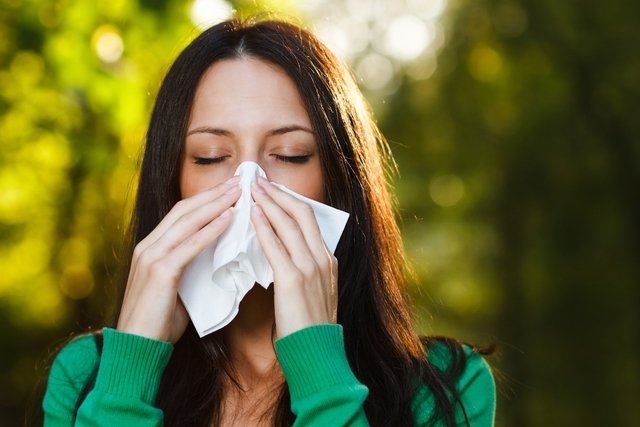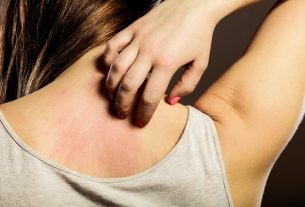Perfume allergy is a condition in which the person is more sensitive to substances that give characteristic smells, such as lyral, responsible for the smell of flowers such as lilies, for example.
This sensitivity causes irritation to the mucous membrane in the nose and causes an inflammatory process that can cause respiratory symptoms, such as runny nose and sneezing, but if the person comes into direct contact with the perfume that contains the allergen substance, skin symptoms such as itchy skin and around the eyes, in addition to headache.
Perfume allergy can be avoided through some measures, such as avoiding allergens and treating with anti-allergy medications, which alleviate symptoms and should be recommended by an allergist or general practitioner.

Main symptoms
The main symptoms that an allergy to perfumes can present are:
- Runny nose;
- Sneezing;
- Swollen and watery eyes;
- Itchy nose;
- Skin irritation;
- Difficulty breathing;
- Nausea and vomiting;
- Wheezing in the chest;
- Headache;
- Dizziness;
- Cough.
If these symptoms are present frequently, it is recommended to see a general practitioner or an allergist so that the allergy to perfumes can be diagnosed or ruled out, and treatment initiated when confirmed.
People who have a respiratory condition such as asthma, allergic rhinitis or some other type of allergy are those most likely to develop an allergy to perfume, so these people should be careful with strong-smelling products.
Online symptom test
To find out if you may have an allergy, such as perfume allergy, please select the symptoms you are experiencing:
This test is a tool that serves as a means of guidance only. Therefore, it is not intended to provide a diagnosis and does not replace consultation with an allergist, immunologist or general practitioner.
How to confirm the diagnosis
The diagnosis of allergy to perfumes is confirmed by the general practitioner or allergist, and is made by observing the symptoms presented at the time of the attack and by the person’s report on previous attacks, in cases of mild and moderate allergies.
However, in serious cases, specific tests are necessary, such as an allergy skin test, for example, to identify which substance is most allergenic and thus indicate appropriate treatment. Check out how the allergy skin test is performed.
How the treatment is carried out
Treatment for allergy to perfumes, whether mild, moderate or severe, can be done by avoiding products that do not have a neutral perfume, and the use of products with a mild perfume is even discouraged. As there is no cure, treatment for allergy to perfumes lasts a lifetime.
However, in cases where the allergy causes many symptoms, the general practitioner or allergist may also recommend the use of anti-allergy medications to control the intensity of symptoms during the allergy attack. See which anti-allergens can be used.
What to do to avoid an allergy attack
To avoid perfume allergy, it is recommended that the person suspend the use of any product, whether personal hygiene, cleaning or even cosmetics, that have a mild or intense smell. It is recommended to only use products with a neutral smell.
Other important recommendations to avoid crises are:
- Avoid products that contain highly allergenic substances such as lyral, geraniol, cinnamal, cinnamyl alcohol, citral, coumarin, eugenol, farnesol, HICC (synthetic), hydroxycitronellal, isoeugenol, limonene, linalool;
- Maintain air circulation in the environmentwith open windows or fan;
- Use products that have a neutral perfume specificationon packaging;
- Avoid public and closed environments, such as food courts or cinemas.
If these measures do not prevent allergy attacks, it is recommended to return to the general practitioner or allergist, so that the case can be evaluated again, and a new treatment can be indicated.
Bibliography
- AMERICAN JOURNAL OF CLINICAL DERMATOLOGY . Fragrance Contact Allergy. 2003. Available at: <https://link.springer.com/article/10.2165%2F00128071-200304110-00006>. Accessed on Aug 27, 2020
- AIR QUALITY, ATMOSPHERE & HEALTH. International prevalence of fragrance sensitivity. 2019. Available at: <https://link.springer.com/article/10.1007/s11869-019-00699-4>. Accessed on Aug 27, 2020

Sign up for our newsletter and stay up to date with exclusive news
that can transform your routine!
Warning: Undefined array key "title" in /home/storelat/public_html/wp-content/plugins/link-whisper-premium/templates/frontend/related-posts.php on line 12
Warning: Undefined array key "title_tag" in /home/storelat/public_html/wp-content/plugins/link-whisper-premium/templates/frontend/related-posts.php on line 13



